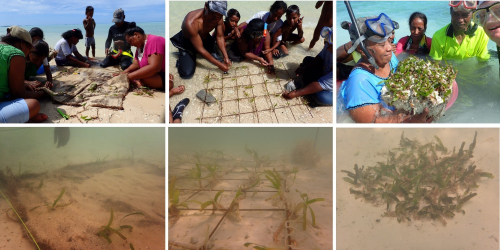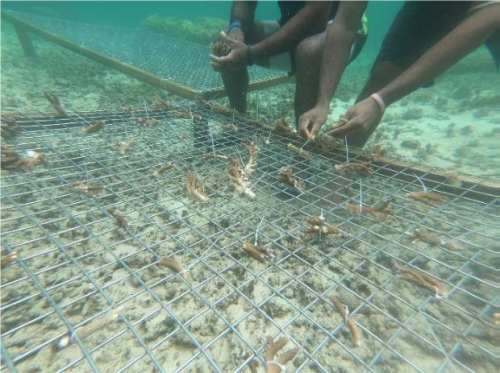
The Pacific Partnership on Ocean Acidification (PPOA) project has been working collaboratively with community members in Fiji and Kiribati to strengthen their coastal resilience to the threat of ocean acidification.
In Fiji, a planning workshop was conducted in October 2019, whereby coral restoration, mangrove planting, and giant clam restoration were identified as key activities for mitigating ocean acidification.
PPOA, in collaboration with Conservation International, Fiji, conducted this work over a 14-day period from 8 – 15 February in Taveuni, particularly in the districts of Vuna and Wainikeli. More than 2,500 mangrove seedlings were planted in the Navakacoa nursery, an initiative undertaken by the women’s group of Navakacoa. The seedlings will be transplanted after four to five months to villages who need them.

Giant clam restoration is also recognised under the PPOA project as an adaptation option and promotes giant clam species restoration, similar to coral and mangroves, as carbon reducing agents. A total of 111 giant baby clams were transported from Matangi Resort for redistribution to the marine protected area (MPA) in Vuna as part of the activities undertaken in Taveuni.
In addition, four coral nurseries were installed in Vuna and Wainikeli, and three new MPAs were also established in the vicinity.
On the atoll of Tarawa, Kiribati, the PPOA team in collaboration with the Ministry of Fisheries successfully established a first-of-its-kind locally managed marine area (LMMA) that incorporates coral, mangrove and seagrass restoration.
PPOA complemented this on-the-ground work by publishing the Nanikai LMMA Management Plan, Guidelines for seagrass restoration in Kiribati, and Guidelines for mangrove planting in Kiribati. These publications will enable local agencies to continue and expand seagrass vegetation restoration and mangrove planting work on Tarawa and other islands in Kiribati.

Mr Max Peter, Principal Fisheries Officer, said “The work that has been done by PPOA is important not only to our coastal fisheries, but it has built skills and confidence in our staff, as well as developed capacity in an areas which was much needed.”
The Pacific Partnership on Ocean Acidification project is a collaborative effort between SPREP, the Pacific Community, and the University of the South Pacific to build resilience to ocean acidification in Pacific island communities. It is funded by the New Zealand Ministry of Foreign Affairs and Trade and the government of the Principality of Monaco.
For more information, please contact Dr Robert D McIntosh, SPREP Oceanography Officer, at [email protected].